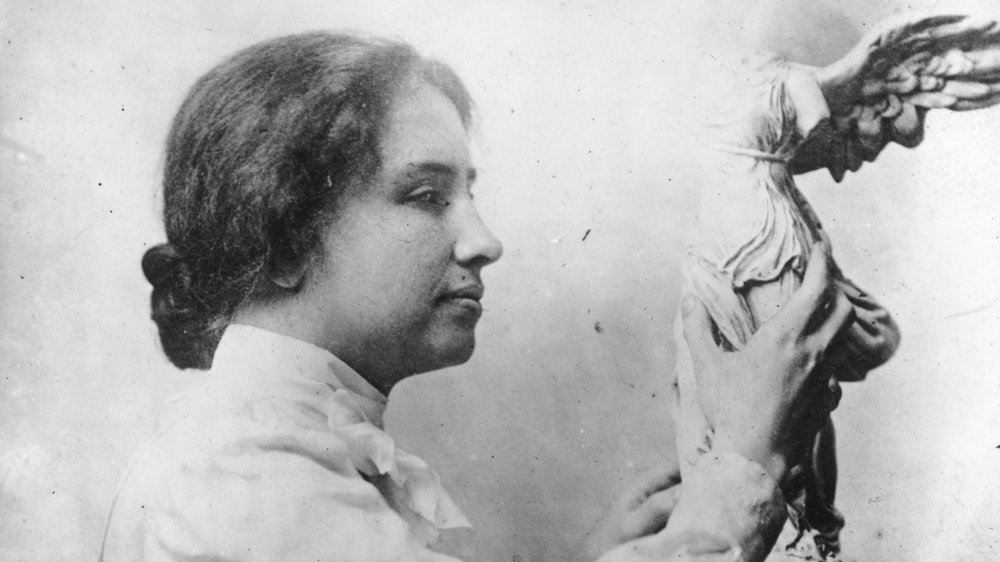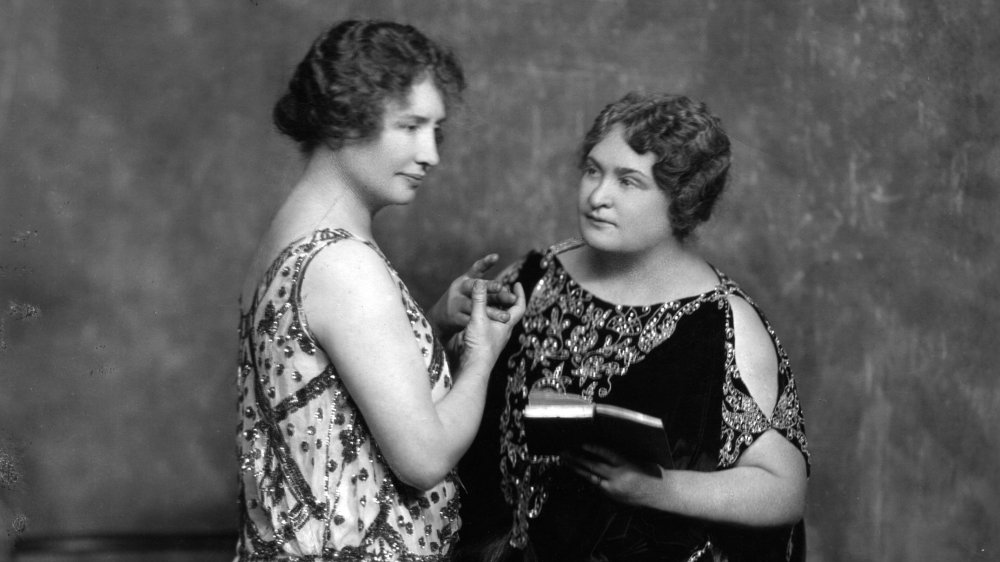The Untold Truth Of Helen Keller
You've heard about Helen Keller and how she managed to become a successful writer and activist despite being deaf and blind. Her life was challenging, but she never truly cared that society believed she wouldn't do well.
Helen Adams Keller was born on June 27, 1880, in Tuscumbia, Alabama, to Arthur and Katherine Adams Keller. Her father, said Biography, served as an officer in the Confederate army. She didn't grow up in wealth, as her family took their income from a cotton plantation. But later on, her father took a job as editor of a weekly newspaper. By the time she was six months old, she was speaking. She began walking at a year old. But at 19 months, she got sick with what doctors called "brain fever," though the Perkins School for the Blind suggests Keller may have contracted scarlet fever or meningitis. This sickness robbed her of the ability to hear and see.
As she grew up, she tried to find any means of communication with her family. She developed a sort of sign language with the daughter of a family cook. But she got impatient when she couldn't join conversations. She frequently threw tantrums so severe that some family members felt she should be institutionalized. This changed when her mother read about the education of another deaf-blind girl, Laura Bridgman. The Keller family approached a doctor who referred them to Alexander Graham Bell — yes, the inventor of the telephone, who later became a friend of Keller.
The Miracle Worker
Bell had been working with deaf children, explained Biography. He suggested they reach out to the Perkins School for the Blind which, according to its website, was the first school in the United States founded specifically for the education of the blind. In turn, that school recommended one of its recent graduates, a young teacher named Anne Sullivan.
Sullivan was nearly blind herself because of eye disease. She arrived at Tuscumbia in March 1887, a day Keller would later call her "soul's birthday." Sullivan found Keller wild but curious. Anne began teaching Helen words by spelling these out on her hand. According to the American Foundation for the Blind, Keller first confused several words, but by April had learned 30 words. She started mastering spelling the words in her hands but also learned braille — letters expressed as raised dots on the page. She also expressed an intention to learn to speak. Sullivan became Keller's long-time companion. Their relationship was celebrated in the play and film The Miracle Worker.
Keller's parents allowed Sullivan to bring Helen to Boston and attend Perkins. There, she learned arithmetic and French. History reported Keller was accepted to the prestigious Radcliffe College in Cambridge, which she attended with Sullivan by her side. It was at Radcliffe that Keller wrote her first autobiography, Story of My Life. Keller graduated from Radcliffe in 1904. Helen became known for her story, but she was also known for being a fierce advocate for her causes.
She was a socialist and an activist
She used her celebrity to fight for the rights of those with disabilities, and was also very political. She joined the Socialist Party in 1909, reported Time Magazine, and joined rallies and walked picket lines. Keller supported the NAACP (National Association for the Advancement of Colored People) and fiercely spoke out against racial injustice. She was a feminist and wanted more women to have access to birth control. And, even more importantly, Keller co-founded the American Civil Liberties Union (ACLU). She also traveled to other countries to lecture, including a five-month-long trip to Asia, according to the American Foundation for the Blind.
While Keller is today more known for her disability, at the time, she was controversial. The FBI put her under surveillance. Time said Keller's memory has been given the Martin Luther King treatment: Their actions had been sanitized and stripped of their more radical tendencies.
Despite ruffling many conservative feathers, Keller received the Presidential Medal of Freedom, one of the highest civilian honors in the country, in 1964. By this time, Keller had already suffered a series of strokes and mostly stayed home. She already lost Sullivan, who died about 30 years earlier. Helen Keller, a fierce advocate for social justice, died on June 1, 1968, in her sleep, a few weeks before her 88th birthday. Her ashes were buried near Sullivan's grave. In the end, despite her unruly start, Helen Keller became an inspiration for the world.


